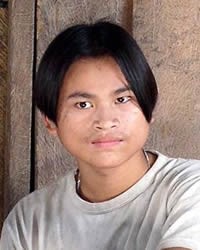Penan in Malaysia

Photo Source:
Cayce - Wikimedia
Creative Commons
|
Send Joshua Project a map of this people group.
|
| People Name: | Penan |
| Country: | Malaysia |
| 10/40 Window: | Yes |
| Population: | 12,000 |
| World Population: | 12,070 |
| Primary Language: | Penan, Eastern |
| Primary Religion: | Ethnic Religions |
| Christian Adherents: | 5.00 % |
| Evangelicals: | 0.30 % |
| Scripture: | New Testament |
| Ministry Resources: | Yes |
| Jesus Film: | No |
| Audio Recordings: | No |
| People Cluster: | Borneo-Kalimantan |
| Affinity Bloc: | Malay Peoples |
| Progress Level: |
|
Introduction / History
The Penan are one of the few remaining nomadic peoples who made their home in the rainforest of Borneo's interior. Today, only a few Penan maintain such a nomadic lifestyle. The Malaysian government has built longhouses for them to settle in. Most of the Penan are located around Baram (in the Miri Division) and around Belaga (in the Kapit Division). Smaller populations can be found in the Bintulu and Limbang Districts.
There are several distinct dialects of Penan, which are like the Kenyah languages but not mutually intelligible with them. However, some of the younger generations are beginning to learn Malay to communicate with other people groups.
What Are Their Lives Like?
The Penan who now live in longhouses cultivate large plots of terraced rice fields. While they have taken up sedentary agriculture as their main livelihood, the change from their traditional hunter-gatherer lifestyle has been difficult. They still hunt wild animals and collect rattan, fruit and other food plants in the forests, and they still depend on the jungles to collect trade items such as camphor, jelutong 'wild rubber', damar 'a type of resin', gaharu 'incense wood', and rattan for making baskets, hats, and bags. Their diet includes fish and prawns from the rivers.
The Penan are generally gentle and soft-spoken. They are closely knit as a community, and they share whatever food they get from the forest. The traditional hunting weapon of the Penan is a keleput ‘blowpipe.' It is made from straight-grained wood, drilled by a long metal rod and uses darts dipped in poison called tajem 'poison obtained from a jungle tree or plant'. Older Penan, due to their nomadic lifestyle, have not had access to education. They cannot speak the national language and can neither read nor write their own language.
What Are Their Beliefs?
The Penan still practice a system of animistic or traditional beliefs. They believe that every animal, tree, river, stream, and rock in the forest has its own spirit. To survive and prosper in the jungle, they must maintain harmonious relations with the spirits.
To the nomadic Penan, death is taken seriously. They believe that the soul of the dead should rest peacefully. As a result, children and adults should not make any noise near burial sites. After a dead person is buried, they will move out from that location to another location, and they will no longer mention the dead person's name. Afterwards, if a Penan wishes to mention the dead person, they will only refer to the burial site of the dead person.
What Are Their Needs?
There is a great need for language development and education, both for older Penan and for the younger generation. Pray for more teachers to offer their skills and knowledge to these people in order to help them improve their livelihood and standard of living. Pray too that the results of such efforts would also give the Penan access to God's good news.
Many Penan still do not have legal documents such as birth certificates and Malaysian identity cards. As a result, many of them still find it difficult to look for better job opportunities and to make it possible for their children to receive an education. Pray that the Penan will gain access to all the benefits of being Malaysians.
Prayer Points
Pray for the Lord to provide them with a huge harvest this year as a testimony of his mercy and love.
Pray for the Church to win, equip and send workers to the Penan people in Malaysia.
Pray for a Holy Spirit-led hunger for righteousness and truth.
Pray this will be the decade when there is a massive movement to Christ among the Penan people.